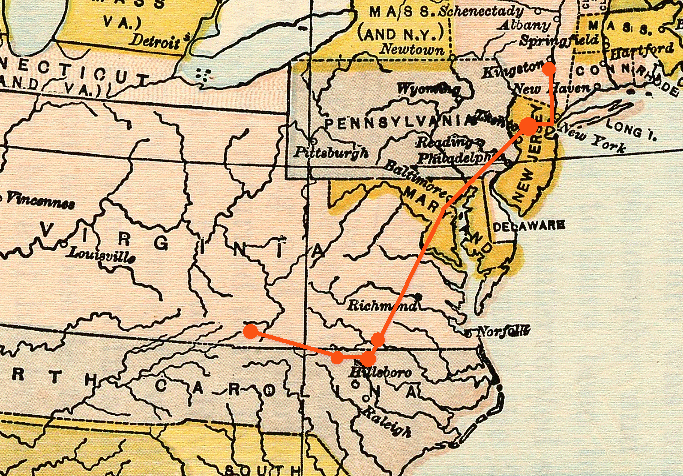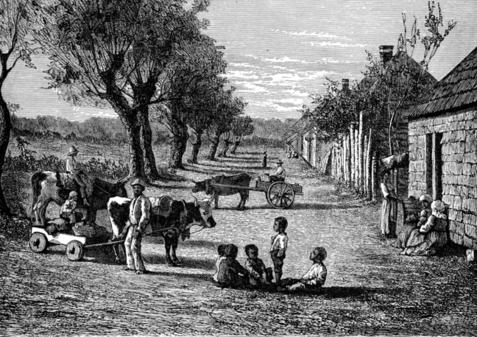The Fulkerson Family Pages
New Jersey (1700 - 1750's) and On to Other Colonies
After three dozen years in Dutch New Amsterdam, and about the same number of years under British rule in New York, most of the Fulkersons emigrated to the west. The Colony of New Jersey became the "core location" of the Fulkersons from about 1700 through the time of the American Revolution.
Lands in New Jersey were initially purchased from English grants held by New York entrepreneurs. The Indian population in Somerset County were Unami Indians, part of the Lenapi Tribe and Algonquin Nation. Some remained and appeared in early records of land sales through the mid-1700s. This was a source of conflict, because the Indians and wealthy English land grant recipients often claimed and sold the same land. Read more about the history of New Jersey.
In the 1740s the British government attempted to evict families who had lived on farms for a generation or more, which led to civil disobedience and rioting - in virtually every county - during that decade.
Bob Fulkerson
During the American Revolution, from 1775 to 1781, the remainder of the Fulkerson branches stayed in New Jersey. Many of their young men enlisted in the New Jersey Militia or the Continental Army, and subsequently received land grants in distant states. Most of the Fulkerson families left New Jersey after the War, and by 1820 had emigrated to numerous new settlements in Pennsylvania, Ohio, Illinois, Kentucky, Tennessee, Missouri and upstate New York.
From a starting point at New York City, Dirck's descendants moved north, west and south. Daughter Magdalena went upriver to Kingston, NY by 1660. His grandchildren Dirck, Nicholas and Philip settled in Somerset County, New Jersey about 1700. The family of Dirck's son Volkert began their move to Virginia and North Carolina in 1754. Two of Volkert's sons (grandsons of Dirck), James and Abraham, settled in southwest Virginia in 1770.
Crops in colonial New Jersey included wheat, barley, flax, oats and rice, as well as corn and hemp
Commentary authored by Bob Fulkerson, from his site Fulkerson.org, with edits, added info, and links in 2016.
Beginning about 1750 and continuing through the early 1800s, most of the Fulkersons gradually left New Jersey. In 1850 there were only 32 remaining in Somerset County, and a few of those were black.
New Jersey was a slave state: "Slavery was encouraged in New Jersey under the [British] 'Concessions and Agreement,' which offered 60 acres of land for every enslaved African imported in 1664...Because New Jersey allowed duty free importation of African people, the colony of New Jersey became the conduit to other states.
Nearly all other states imposed a tax on the importation of men, women, and children from Africa to be used as slave labor. In 1726, there were 2,581 African people counted as slaves in New Jersey.
By 1790, there were 14,185....comprising nearly eight percent of New Jersey’s population." [Source: Slavery in New Jersey] Despite laws intended to gradually phase out slavery in New Jersey, beginning in 1804, slavery or forced labor still existed to a limited extent at the outbreak of the Civil War in 1861.
New Jersey was the only Northern state that neither voted for Abraham Lincoln in 1860 nor agreed to ratify the 13th Amendment (abolishing slavery) of the United States Constitution.
Only a stone's throw from New York City, in many ways New Jersey was very much a "Southern" state. We tend to find incidences of slave ownership among the Fulkersons only when revealed in will records, although it was probably more prevalent than these discoveries have made known. Property tax records may yield further information.
This accounting begins with the descendants of Volkert Dircks, son of Dirck Volckertszen De Noorman, and Volkert's wife, Annetje Phillips, daughter of Phillip Langelans. Based on all available evidence, this listing includes eleven children, many of whom were among the early settlers of Somerset County, New Jersey.
Somerset County locations where Fulkersons settled, and where battles occurred, included New Brunswick, Millstone, Raritan and Bound Brook.




